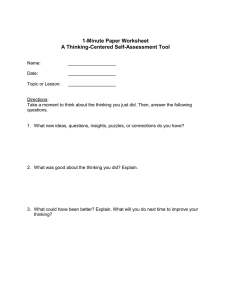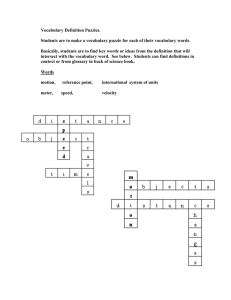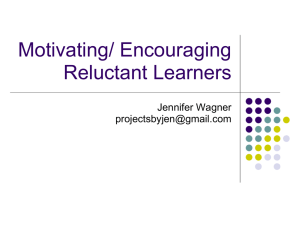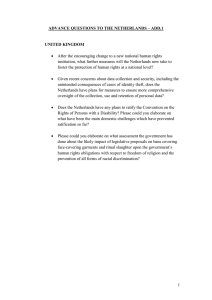1 The Challenger Programme, Y8-Y9: March to July 2016 All
advertisement
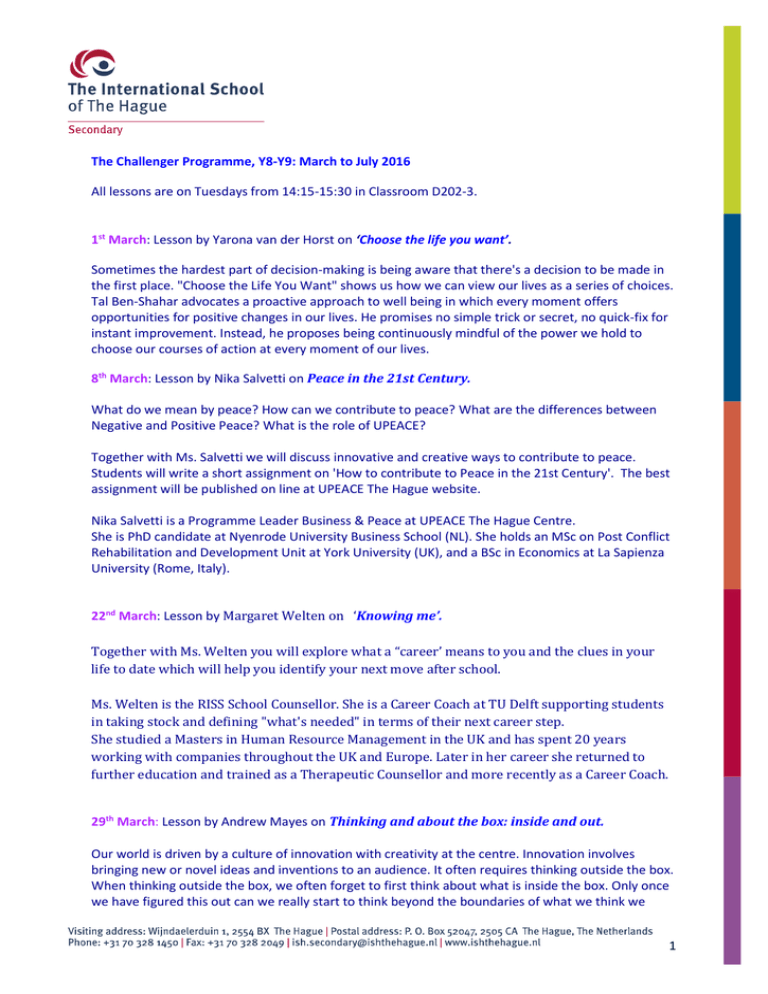
The Challenger Programme, Y8-Y9: March to July 2016 All lessons are on Tuesdays from 14:15-15:30 in Classroom D202-3. 1st March: Lesson by Yarona van der Horst on ‘Choose the life you want’. Sometimes the hardest part of decision-making is being aware that there's a decision to be made in the first place. "Choose the Life You Want" shows us how we can view our lives as a series of choices. Tal Ben-Shahar advocates a proactive approach to well being in which every moment offers opportunities for positive changes in our lives. He promises no simple trick or secret, no quick-fix for instant improvement. Instead, he proposes being continuously mindful of the power we hold to choose our courses of action at every moment of our lives. 8th March: Lesson by Nika Salvetti on Peace in the 21st Century. What do we mean by peace? How can we contribute to peace? What are the differences between Negative and Positive Peace? What is the role of UPEACE? Together with Ms. Salvetti we will discuss innovative and creative ways to contribute to peace. Students will write a short assignment on 'How to contribute to Peace in the 21st Century'. The best assignment will be published on line at UPEACE The Hague website. Nika Salvetti is a Programme Leader Business & Peace at UPEACE The Hague Centre. She is PhD candidate at Nyenrode University Business School (NL). She holds an MSc on Post Conflict Rehabilitation and Development Unit at York University (UK), and a BSc in Economics at La Sapienza University (Rome, Italy). 22nd March: Lesson by Margaret Welten on ‘Knowing me’. Together with Ms. Welten you will explore what a “career’ means to you and the clues in your life to date which will help you identify your next move after school. Ms. Welten is the RISS School Counsellor. She is a Career Coach at TU Delft supporting students in taking stock and defining "what's needed" in terms of their next career step. She studied a Masters in Human Resource Management in the UK and has spent 20 years working with companies throughout the UK and Europe. Later in her career she returned to further education and trained as a Therapeutic Counsellor and more recently as a Career Coach. 29th March: Lesson by Andrew Mayes on Thinking and about the box: inside and out. Our world is driven by a culture of innovation with creativity at the centre. Innovation involves bringing new or novel ideas and inventions to an audience. It often requires thinking outside the box. When thinking outside the box, we often forget to first think about what is inside the box. Only once we have figured this out can we really start to think beyond the boundaries of what we think we 1 know. In Andrew’s lesson we will explore design thinking, recognizing the limitations in problem solving and explore strategies to extend thinking beyond a given situation. We will discuss Divergent and Convergent thinking, and explore ways we can generate new ideas that could be useful for personal projects, problem solving and solution development. Mr. Andrew Mayes works for the International Baccalaureate and particularly enjoys discussing design thinking, technology and problem solving techniques with teachers, parents, colleagues and students across the world. 5th April: Lesson by Dr. Stephen Buskin on Hot topics for teenagers. We will discuss topics such as Addictions, gaming and risk taking in teenagers. Dr. Buskin is Pediatrician and Classical Homeopath. He Works in the International Health Centre in The Hague and runs his own clinic called the Homeopathic Clinic for Children in Wassenaar. The clinic combines alternative and mainstream medicine. Dr. Buskin has worked in South Africa, Israel, England, Scotland, USA and The Netherlands. 12th April: Lesson by Katherine Fortier on ‘Stress and Coping’. What "stresses you out”? Homework? Exams? Arguments? Educational psychologist Katherine Fortier will talk about the nature of stress, how it works, and what to do about it. From the neuroscience of the brain-body response, to practical things you can do to reduce stress in your own life, this will be a lesson that aims to help you understand yourself better, and cope better. Katherine Fortier is a Child and Educational Psychologist in private practice in The Hague. She serves as a psycho-educational consultant to the HCO (Haagse Centrum voor Onderwijsbegeleiding) and is busy in many international schools in and around The Hague. She also sees kids and teen-agers for counselling and psychotherapy at her offices in the Archipel practice. Originally from Canada, Katherine obtained her BA (Hon) from St Mary’s University in Psychology and Masters of Applied Science in Child and Educational Psychology from the University in Waterloo. 19th April: Lesson by Dr.Nan Deardorff McClain on “The Importance of human Microflora in establishing a healthy body and mind”. Dr. Deardorff-McClain will explain why our Microbiome, the trillions of healthy microbes living on our bodies, are so critical to good health. It turns out that our diet has a huge impact on these important organisms. We will have a look at what foods can benefit our intestinal flora and if your taste buds are curious enough, we'll do a blind taste challenge! An opportunity to create a healthy recipe will follow, so bring your appetites! 2 Dr. Deardorff-McClain was introduced to natural medicine as an elite cyclist racing internationally while based in Boulder, Colorado. It was there that she became fascinated with the world of holistic healing. After earning her Bachelors of Science in Marketing and International Business, she enrolled in a massage therapy program. Determined to know more and put her knowledge to use in the healing arts, she studied to earn the degree of Naturopathic Doctor at Bastyr University in Seattle, Washington. Now calling Delft, The Netherlands, home, she enjoys teaching clients how to live healthier lives using the healing power of nature. She has instructed alternative medicine courses at Everglades University for the past six years, and greatly enjoys the genuine enthusiasm and work ethic of the students working towards their degrees in Alternative medicine. She teaches introductory courses in this bachelors program in biology, botany, homoeopathy, detoxification and mind-body medicine. 26th April: Lesson by Dr. Shirly Abiri-Wisel on Puberty-The physical signs of sexual development. What are the hormonal and physical changes that occurred from a child's body to mature adult's body? We will also learn about abnormal puberty, gynecomastia and Hirsutism- what is it and how can we treat it? Dr. Shirly Abiri-Wisel is paediatric endocrinologist. She has studied medicine in Budapest, Hungary. She was working in Wolfson hospital in Israel as a paediatric and as an endocrinologist. The last two years, she enjoys her expat life with her family in The Netherlands. 15th May: Lesson by Kitty lesson by Kitty van der Heijden on ’ Why Sustainability should matter to YOU too’. Mrs. van der Heijden is the Director of WRI’s Europe Office since 1 January 2014. The World Resources Institute is the #1 Think Tank on Environment in the world. Kitty is an economist by training (Erasmus University Rotterdam) with 25 years hands-on experience in sustainable development. Prior to joining WRI, Kitty was the Ambassador for Sustainable Development and Director of the Department for Climate, Energy, Environment and Water in the Ministry of Foreign Affairs of the Netherlands. In 2013, she was elected the 3rd best civil servant of the Netherlands and was also awarded a national Ribbon of Honor for her efforts to raise public awareness on the challenges and opportunities sustainable development. In 2014, Strategie Platform Overheid elected her “Influencer of the Year”, and daily newspaper ‘Trouw’ ranked her as #20 in the annual Top 100 listing of Sustainability Leaders in the Netherlands on 10 October 2014. 3 24th May: Study trip to SHELL, Rijswijk by Marco de Bruin, Environmental Specialist. We are going to learn about oil and gas and their productions, having a Virtual Reality Demonstration and technical contests. We meet on The Plaza at 11:10 (Sharp!) and travel by school bus to SHELL (We will be back to ISH at 16:00. 31st May: Lesson by Dr. Miroslav Zivkovic on Puzzletime. In this lesson we will explore the world of puzzles. It may be said that puzzles are important to people in a lifetime. For example, puzzles may help small children to develop hand-eye co-ordination and fine motor skills, next to attention, concentration and basic thinking skills. Also, puzzles exercise students' critical thinking skills while providing needed practice in mathematics, spelling, and other areas of the Curriculum. They are recommended to older generation (and not only to them!) as one of the mechanisms of mental activity that may help preventing Alzheimer's disease. We will first briefly talk about puzzles through history and see who were the most prominent people who created these, and even published the books about them. We will discuss the puzzles that led to important scientific discoveries or marked the beginning of the completely new scientific fields. And naturally, we will solve some (more or less complex) puzzles. Dr. Miroslav Zivkovic is a Researcher at System and Network Engineering Group, Informatics Institute, University of Amsterdam. He holds a PhD from Design and Analysis of Communication Systems group, University of Twente, the Netherlands, and a dipl.-ing. Title from Faculty of Electrical Engineering, University of Belgrade, Serbia. His current research interests are software defined networking and network performance of large data sets (Big Data). 7th June: lesson by Dr. Ryoichi Ishihara on Quantum computers. Do you want a computer, which can design a medicine curing your flu? Don’t you think our computer consumes too much energy? Is the Internet safe enough to protect your privacy? TUDelft has started with industry partners to develop quantum computer, which can solve those problems among others. In the lesson let’s discuss how the quantum computer is made and how and when it will make our life beautiful in future. Dr. Ryoichi Ishihara is an associate professor at Delft University of Technology. He studied physical electronics and obtained Ph.D. degree at Tokyo Institute of Technology in Japan in 1996. 4 In the same year he moved to TUDelft and started research and education at the department of microelectronics. His current research focuses on interface technology for quantum computer and printing of fast electronics on paper. 26th June: Lesson by Mrs. Van der Horst: High tea and Student’s presentations. We are honoured to have these lecturers who agreed to come to ISH and to share their knowledge and experience with our students. The programme can still be subject to minor changes. Yarona van der Horst Coordinator Challenger Project at ISH 5
